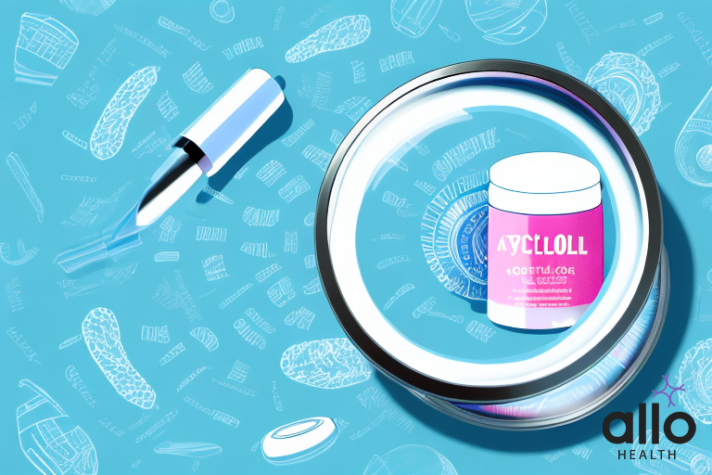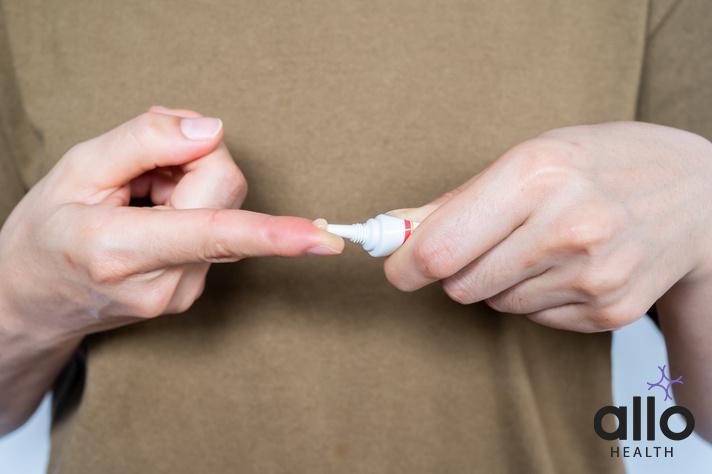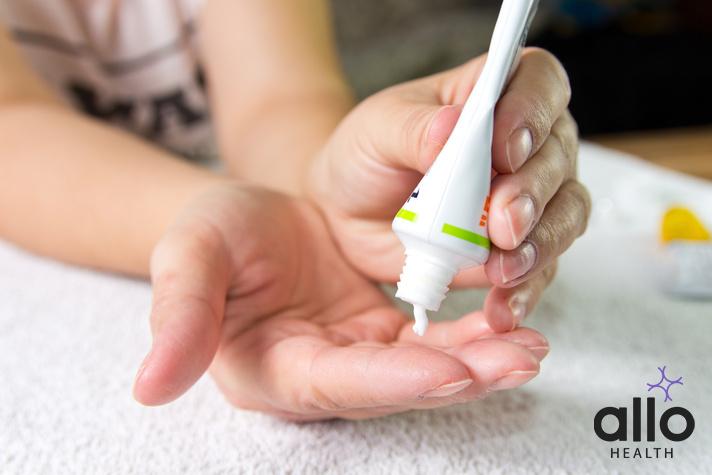What Is Acyclovir Cream?

Allo Health is dedicated to personalized well-being, offering support and trusted information tailored to individual health goals. The platform emphasizes human-generated content, led by a distinguished medical team of experts, including physicians and sexual health specialists. Their commitment to credibility involves rigorous fact-checking, authoritative research, and continuous updates to ensure accurate, up-to-date information. Allo Health's unique approach goes beyond conventional platforms, providing expert-led insights and a continuous commitment to excellence, with user feedback playing a crucial role in shaping the platform's authoritative voice.

Dr Sanina Mansoor holds MBBS degree from Yenepoya university,Mangalore.She has 8 years of experience working as a medical officer at various health centres and medical colleges.
Why This Was Upated?
Our experts continually monitor the health and wellness space, and we update our articles when new information became available.
Updated on 19 February, 2024
- Article was updated as part of our commitment to diversity, equity, and inclusion.

"The following blog article provides information about a drug or brand name drug and its potential effects or benefits. However, it is crucial to understand that this information is intended for general educational purposes only and should not be considered a substitute for professional medical consultation. It is highly recommended to consult with a qualified healthcare professional before making any decisions regarding medication, treatment, or healthcare management.
Book consultation
Individuals have unique medical conditions, and the information provided in this article may not be applicable to everyone. Only a qualified healthcare provider can evaluate your specific medical situation, taking into account your medical history, conducting appropriate tests, and providing personalized advice and recommendations. They are equipped to make informed decisions tailored to your individual needs.
It is crucial to emphasize that self-diagnosis, self-medication, or disregarding medical advice can have serious health consequences. This article may reference specific brand names or drugs for illustrative purposes. Mention of these names does not imply endorsement, recommendation, or guarantee of their efficacy or safety. The choice of medication should be based on discussions and individualized guidance from a healthcare professional who has a comprehensive understanding of your medical condition.
"If you suffer from cold sores or genital herpes, you know how uncomfortable and embarrassing these outbreaks can be. Fortunately, there are treatments available that can help alleviate the symptoms and even prevent future outbreaks. One such treatment is Acyclovir Cream. In this article, we’ll dive into the details of how this cream works, how to use it for optimal results, and its effectiveness compared to other cold sore treatments.
Acyclovir Cream Uses And Benefits
Acyclovir cream is a topical medication that belongs to the antiviral class of drugs. It is commonly used to treat certain viral infections, primarily those caused by the herpes simplex virus (HSV). Here are some details regarding the uses and benefits of acyclovir cream:
- Herpes Simplex Virus Infections (HSV):
- Cold Sores (Herpes Labialis): Acyclovir cream is often prescribed to treat recurrent cold sores, which are caused by HSV type 1. Applying the cream to the affected area can help reduce the severity and duration of the outbreak.
- Genital Herpes (Herpes Genitalis): Acyclovir cream may also be used for the treatment of genital herpes caused by HSV type 2. It can help alleviate symptoms such as itching, pain, and sores in the genital and anal areas.
- Chickenpox (Varicella-Zoster Virus): Acyclovir cream may be used in the treatment of chickenpox, particularly to relieve the itching associated with the skin rash. But, oral antiviral medications are more commonly prescribed for systemic treatment of chickenpox.
- Shingles (Herpes Zoster): Shingles, caused by the reactivation of the varicella-zoster virus (VZV), can lead to a painful rash. While acyclovir cream may be used to relieve symptoms, oral antiviral medications are usually preferred for the treatment of shingles.
- Mechanism of Action: Acyclovir works by inhibiting the replication of the viral DNA. It is converted into its active form, acyclovir triphosphate, inside infected cells. This active form interferes with the viral DNA polymerase, an enzyme necessary for the replication of the virus, thus preventing the virus from multiplying.
- Application and Dosage:
- The cream is typically applied to the affected area of the skin, such as the lips or genital region, as directed by the healthcare provider.
- The frequency of application and duration of treatment may vary based on the specific condition being treated. It’s important to follow the prescribed dosage and application instructions.
- Side Effects:
- Common side effects may include mild burning or stinging at the application site.
- Serious side effects are rare but can include an allergic reaction. If you experience severe redness, itching, or swelling, it’s essential to seek medical attention.
- Precautions:
- Acyclovir cream is for external use only and should not be applied to the eyes or inside the mouth or nose.
- It is important to inform your healthcare provider about any existing medical conditions or medications you are taking before using acyclovir cream.
It’s crucial to use acyclovir cream under the supervision and guidance of a healthcare professional, who will determine the appropriate treatment plan based on the specific viral infection and individual health considerations.

Acyclovir Cream Dosage
The specific dosage of acyclovir cream can vary depending on the type of viral infection being treated and the severity of symptoms. It’s important to follow the healthcare provider’s instructions and the information provided on the medication label. The following are general guidelines for acyclovir cream dosage:
- Cold Sores (Herpes Labialis):
- Apply a sufficient amount of acyclovir cream to cover the affected area on the lips or face.
- Typically, the cream is applied five times a day (every 3 to 4 hours) for about 4 days.
- Treatment may be extended if healing is not complete after 4 days.
- Genital Herpes (Herpes Genitalis):
- Apply enough cream to cover the affected genital or anal area.
- The usual frequency is five times a day for about 5 to 10 days.
- Treatment may be extended based on the healthcare provider’s recommendation.
- Chickenpox (Varicella-Zoster Virus):
- While acyclovir cream may be used for chickenpox, oral antiviral medications are more commonly prescribed for systemic treatment.
- If acyclovir cream is used, it is typically applied to the rash as directed by the healthcare provider.
- Shingles (Herpes Zoster):
- Acyclovir cream may be applied to the shingles rash, but oral antiviral medications are generally preferred for the treatment of shingles.
- If used, the cream is typically applied to the affected area as directed by the healthcare provider.
- General Application Instructions:
- Wash hands before and after applying the cream.
- Use a clean cotton swab or your fingertips to apply the cream to the affected area.
- Avoid getting the cream in the eyes or mouth. If accidental contact occurs, rinse thoroughly with water.
- Do not cover the treated area with a bandage or dressing unless directed by the healthcare provider.
- Missed Dose:
- If a dose is missed, apply the cream as soon as you remember.
- If it is almost time for the next scheduled dose, skip the missed dose and resume the regular dosing schedule.
- Overdose:
- Overdose is unlikely with topical acyclovir cream. But, if accidental ingestion occurs or if an excessive amount is applied, seek medical attention.
It’s important to note that these are general guidelines, and individual dosage instructions may vary. Always follow the specific instructions provided by your healthcare provider and the information on the medication label. If you have any questions or concerns about the dosage or application of acyclovir cream, consult with your healthcare professional for clarification.
Acyclovir Cream Side Effects and Precautions
Acyclovir cream, like any medication, can cause side effects and requires certain precautions. It’s important to use the medication under the guidance of a healthcare professional and to be aware of potential adverse effects. Here are details on side effects and precautions associated with acyclovir cream:
Side Effects:
- Common Side Effects:
- Mild burning or stinging at the application site is a common side effect.
- Redness and itching may also occur.
- Less Common Side Effects: Rarely, allergic reactions may occur. Seek medical attention if you experience severe redness, swelling, or itching.
- Systemic Absorption: Although the systemic absorption of acyclovir through topical application is minimal, it’s still possible to experience systemic effects in some cases. This is more likely if the cream is used on large areas of broken or irritated skin.
Precautions:
- Allergic Reactions:
- Inform your healthcare provider about any known allergies or sensitivities before using acyclovir cream.
- If you develop signs of an allergic reaction, such as severe itching, swelling, or difficulty breathing, seek medical attention immediately.
- Avoid Contact with Eyes and Mucous Membranes:
- Do not apply acyclovir cream to the eyes, inside the mouth, or inside the nose.
- If accidental contact occurs, rinse the affected area with water.
- Pregnancy and Breastfeeding: Inform your healthcare provider if you are pregnant or breastfeeding before using acyclovir cream. The potential risks and benefits will be considered to determine if the medication is appropriate in these situations.
- Immunocompromised Individuals: Individuals with weakened immune systems, such as those with HIV or undergoing immunosuppressive therapy, may have an increased risk of systemic absorption. Close monitoring is necessary in these cases.
- Avoid Close Contact with Infected Areas: To prevent the spread of the virus, avoid close contact with areas where the cream has been applied, especially if the cream is used to treat genital herpes.
- Use as Directed:
- Follow the prescribed dosage and application instructions provided by your healthcare provider.
- Do not use more than the recommended amount or for a longer duration than prescribed.
- Drug Interactions: Inform your healthcare provider about all medications, including over-the-counter drugs and herbal supplements, that you are currently taking. Some medications may interact with acyclovir.
- Medical History: Provide a detailed medical history to your healthcare provider, especially if you have kidney concerns, as acyclovir is primarily excreted through the kidneys.
If you experience any unusual or severe side effects while using acyclovir cream, contact your healthcare provider promptly. It’s crucial to use the medication as directed and to communicate openly with your healthcare professional about any concerns you may encounter during treatment.

Acyclovir Cream Drug Interactions
Acyclovir cream, when used topically, generally has minimal systemic absorption, which reduces the likelihood of significant drug interactions compared to oral forms of acyclovir. But, it’s essential to inform your healthcare provider about all medications, including over-the-counter drugs, herbal supplements, and topical products, that you are using to ensure there are no potential interactions. Here are some considerations regarding drug interactions with acyclovir cream:
- Topical Products: Avoid using other topical products in the same area where acyclovir cream is applied unless directed by your healthcare provider. This includes creams, ointments, or lotions, as they may interfere with the absorption and effectiveness of acyclovir.
- Unknown Interactions: Because acyclovir cream is primarily applied topically and has minimal systemic absorption, the risk of significant drug interactions is low. But interactions can still occur, so it’s essential to inform your healthcare provider about all medications and products you are using.
- Oral Acyclovir: If you are using oral acyclovir or other systemic antiviral medications, inform your healthcare provider, even though the risk of interactions is less likely with topical acyclovir.
- Nephrotoxic Drugs: Acyclovir is primarily excreted through the kidneys. Inform your healthcare provider if you are taking other medications that may have nephrotoxic effects (adverse effects on the kidneys) to ensure proper monitoring.
- Immunosuppressive Medications: Individuals taking immunosuppressive medications or undergoing immunosuppressive therapy should inform their healthcare provider. While topical acyclovir is generally well-tolerated, caution is advised in immunocompromised individuals.
- Specific Drug Interactions: While specific drug interactions with acyclovir cream are limited, it’s crucial to discuss your full medication history with your healthcare provider. They can provide personalized guidance based on your individual health status.
Always follow your healthcare provider’s instructions and inform them about any changes in your medication regimen. This includes newly prescribed medications, over-the-counter drugs, herbal supplements, and any other substances you may be using. If you have concerns about potential drug interactions with acyclovir cream, consult with your healthcare professional for personalized advice.
Most Asked Questions
-
What is Acyclovir cream used for?
Acyclovir cream is primarily used to treat viral infections, particularly those caused by the herpes simplex virus (HSV). It is commonly prescribed for conditions such as cold sores (herpes labialis) and genital herpes (herpes genitalis). The cream works by inhibiting the replication of the viral DNA, helping to reduce the severity and duration of outbreaks.
-
How do I apply Acyclovir cream for cold sores?
Apply a sufficient amount of Acyclovir cream to cover the affected area on the lips or face. Typically, the cream is applied five times a day, with approximately 3 to 4 hours between each application. This regimen is usually followed for about 4 days, but the duration may be extended based on the healthcare provider's recommendation.
-
Are there any precautions I should take while using Acyclovir cream?
Yes, several precautions should be observed. Avoid applying the cream to the eyes, inside the mouth, or inside the nose. Inform your healthcare provider about any known allergies, and seek medical attention if you develop signs of an allergic reaction. If you are pregnant or breastfeeding, discuss the potential risks and benefits with your healthcare provider before using Acyclovir cream. Additionally, use the medication as directed, and do not exceed the recommended dosage or duration of treatment.
-
Can Acyclovir cream be used for genital herpes?
Yes, Acyclovir cream is often prescribed for the treatment of genital herpes (herpes genitalis). It should be applied to the affected genital or anal area. The usual frequency is five times a day for about 5 to 10 days. The healthcare provider may adjust the duration of treatment based on individual circumstances.
-
What are the common side effects of Acyclovir cream?
Common side effects of Acyclovir cream include mild burning or stinging at the application site, as well as redness and itching. These side effects are generally mild and temporary. Serious side effects are rare but may include allergic reactions. Seek medical attention if you experience severe redness, swelling, or itching.






































